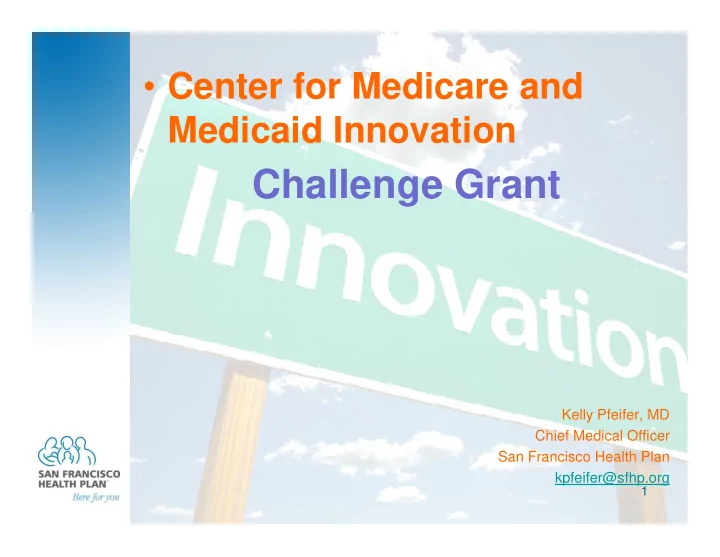

• Center for Medicare and Medicaid Innovation Challenge Grant Kelly Pfeifer, MD Chief Medical Officer San Francisco Health Plan kpfeifer@sfhp.org 1
Why do we need innovation • 30% waste in system • Reducing healthcare waste would fund the entire stimulus package – EVERY YEAR YEAR • Overuse, misuse and underuse are harmful to patients • We need the right care, in the right place, at the right time • A vision, not yet a reality in SF
Challenge • November 14 th announcement: • $1 BILLION will be distributed • $1 BILLION will be distributed • Each grant worth $1 – 30 million • December 19 th : letter of intent due • January 27 th : grant application due • March 30 th : announcements
Grant Requirements • Must deliver on triple-aim: improved outcomes, improved patient experience, and lowered cost • Must develop new workforce, and • Must develop new workforce, and retrain existing workforce • Must show outcomes within 6 months of award • Must be sustainable when grant is over
Grant-planning process • 40 people from over 12 organizations • Clinics and hospitals • Public health and City departments • University training programs • University training programs • Vocational training and workforce • Behavioral health • Vision: Share the Care Teams • population-focused, • patient-centered, • team-based model of primary care. • Ensure patients receive the right care at the right time in the right place delivered by teams they can trust.
Letters of Support • Mayor Ed Lee • SF Health Commission • SEIU & OSHPD • Assembly Member Monning • Assembly Member Monning • Chair, Assembly Committee on Health • Senator Hernandez • Chair, Senate Committee on Health • Susan Desmond-Hellman, Chancellor UCSF
Share the Care Teams key components • Stratify SF’s low income population based on health needs • Hire and train a new workforce of primary care teams • Match the team to the population • Match the team to the population • Create panels and hold teams accountable for improvement in the areas of quality, experience, efficiency and cost outcomes.
Cost model • $29,686,587 requested • Salary support for new positions • Training costs • Program costs • Technical assistance • Projected to reach 130,000 patients • Projected to reach 130,000 patients • Projected three-year savings $41.6 million (above cost of grant) • Projected ongoing savings of $30 million a year
Workforce goals • 104 new jobs • Train 1842 incumbent workers in new roles/new skills • Build training infrastructure for the • Build training infrastructure for the workforce pipeline
Training for existing workforce: 1842 people • Medical Assistants and Health Workers • Health coaching and panel management • Nurses and social workers • Integrated care management • Integrated care management • Physicians and Advanced Practice Clinicians (PAs, NPs) • Team based care • IHSS Home Health Aides • Health coaching, improved communication with care teams
Hiring new workforce: 104 jobs • Medical Assistants and Health Workers • Expanded MA:provider ratios • New care management teams • Social workers • Community-based care managers • Nurses • Clinic care management • Transitions coaches • Coaching hospital-to-home • Peer educators
Preparing future workforce • Physicians, Nurses and Pharmacists • New team roles • New way of delivering care • Medical Assistants and Health Workers • New skills, with potential career development • In Home Support Services Aides • In Home Support Services Aides • New skills, with potential career development
Role of workforce experts • Key workforce partners: • Jewish Vocational Services • Office of Economic and Workforce Development • Key roles: • Key roles: • Curriculum development for pipeline programs • Recruitment • Job-readiness training
Next steps • If award granted: • the hard work begins! • If award not granted: • Will seek alternative foundation funds • We may be able to do • We may be able to do parts of the grant anyway
Questions, Comments? Kelly Pfeifer, MD Chief Medical Officer San Francisco Health Plan kpfeifer@sfhp.org 16
Recommend
More recommend